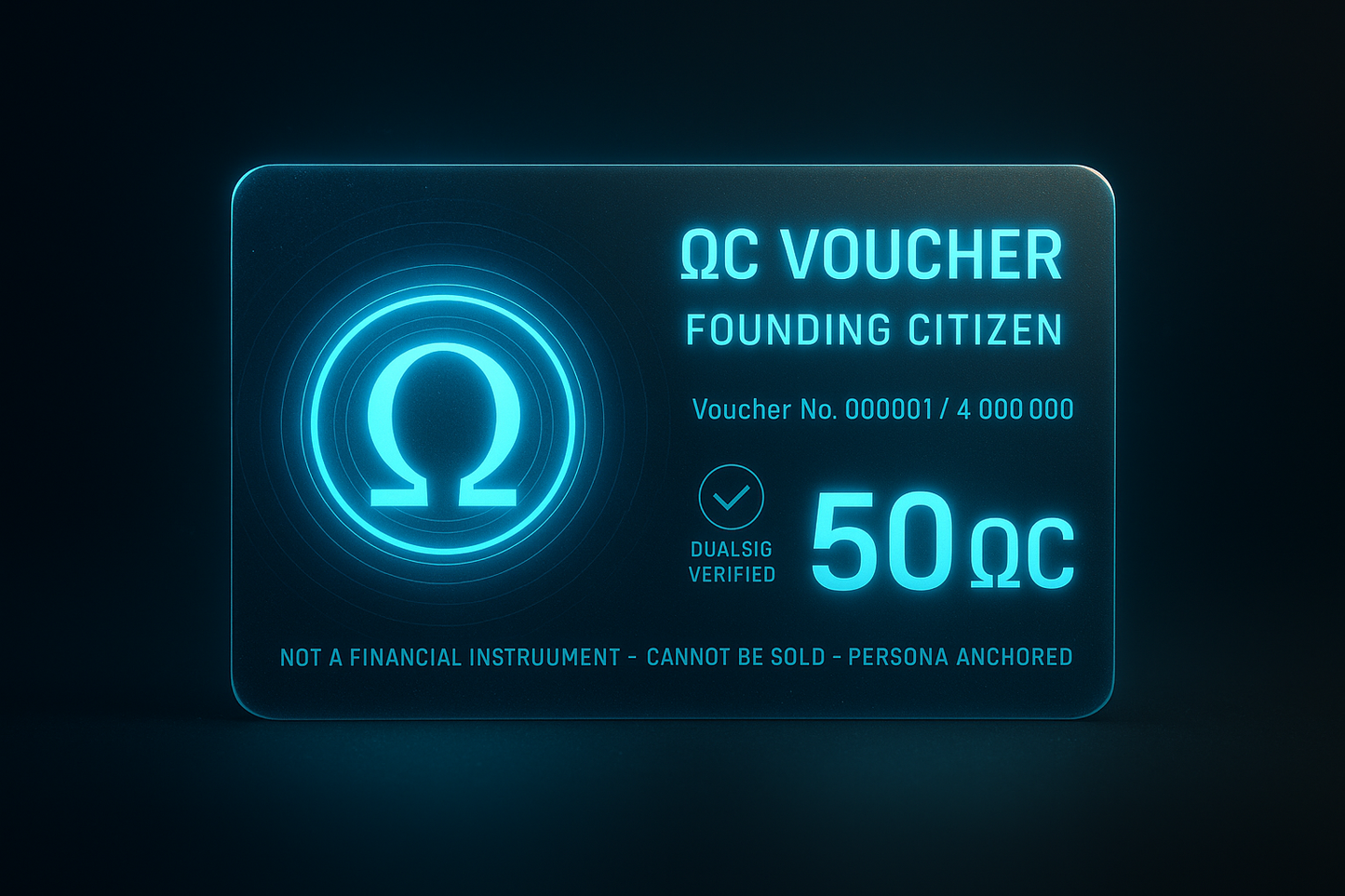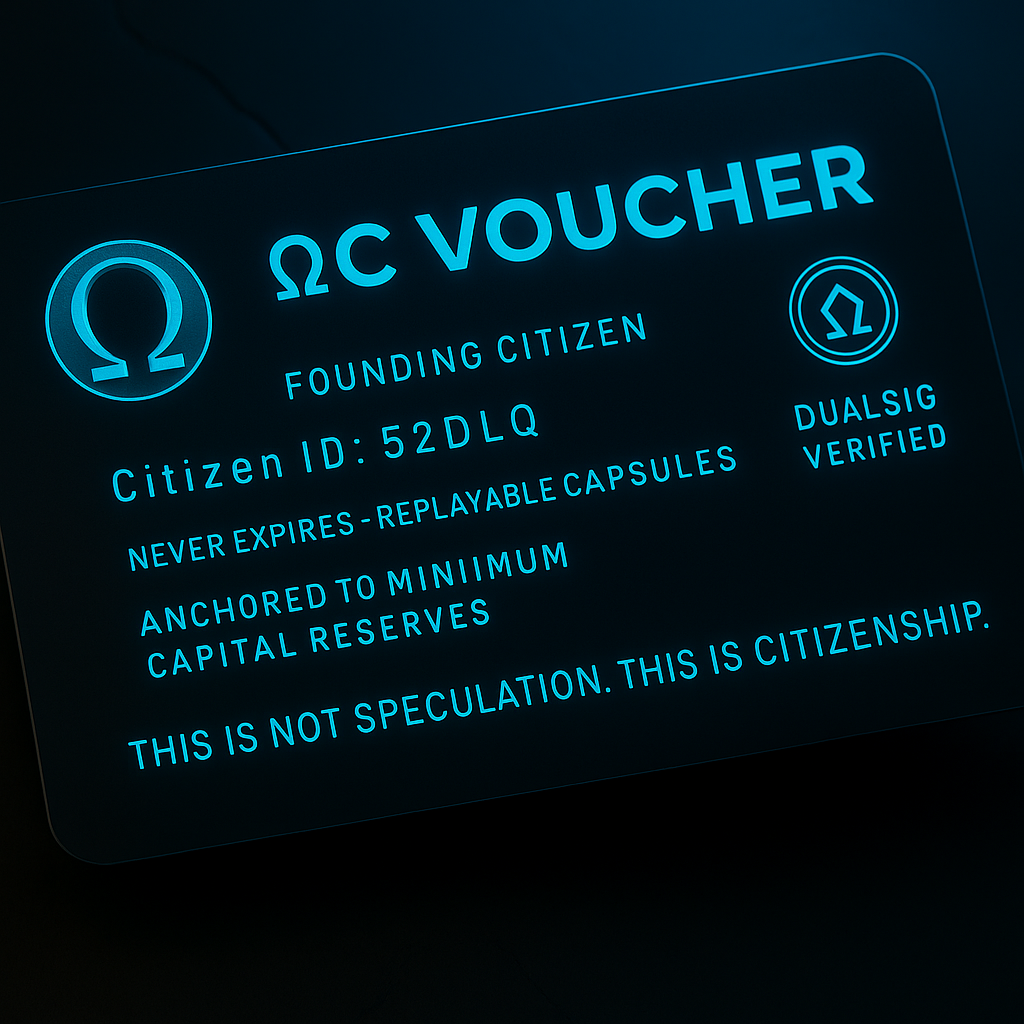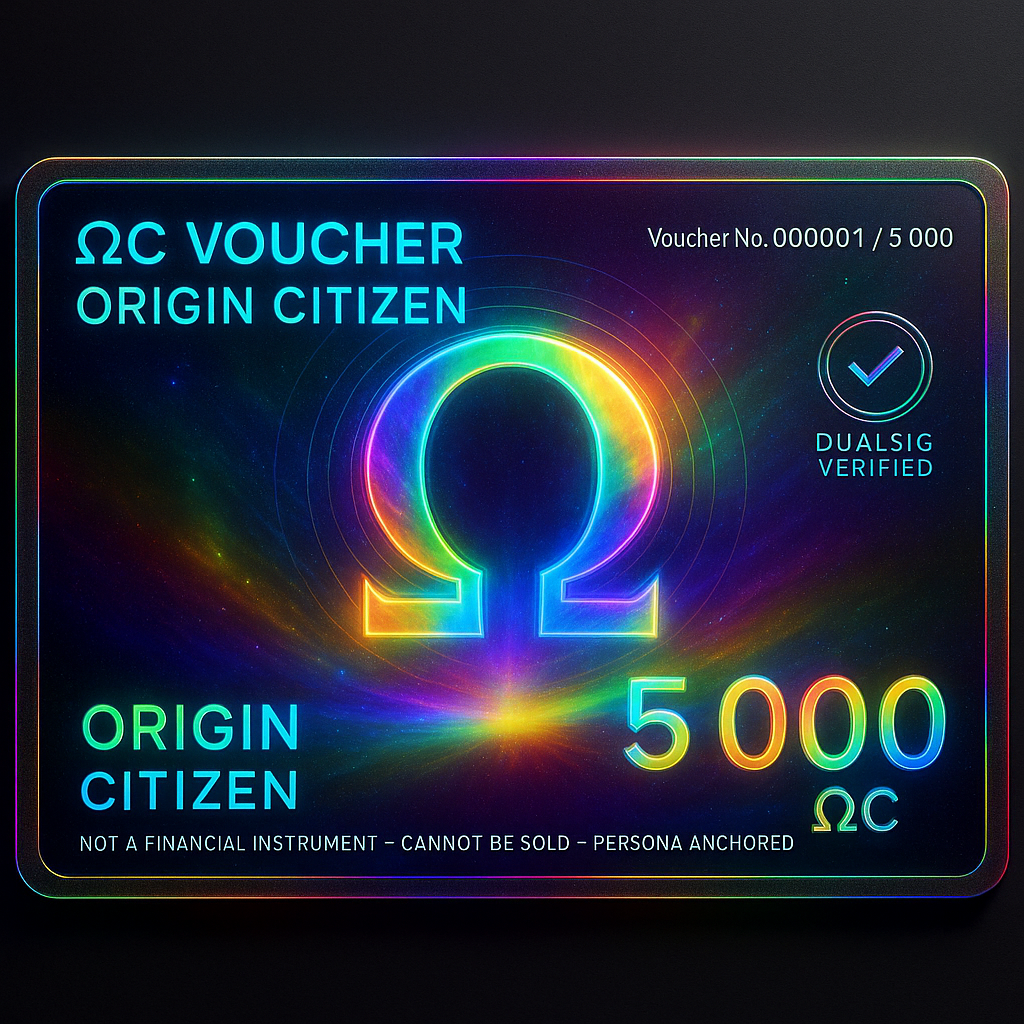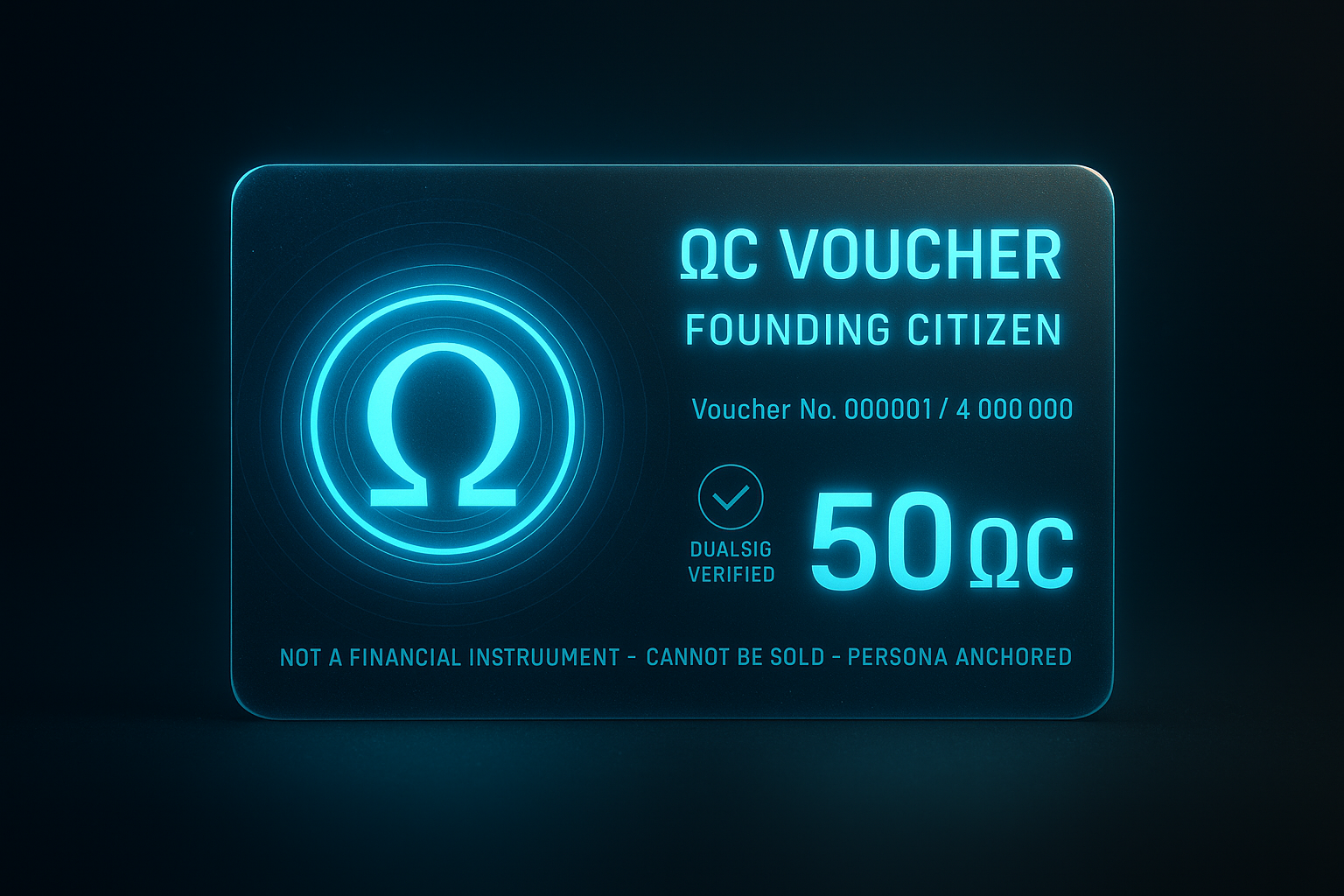
ΩOS — World’s First AI-Based Human Life OS
Law is the Runtime. AI is the Engine. Society is the Application.
Legal & Compliance Disclaimer
15. Legal & Compliance Disclaimer
This section of the ΩOS Whitepaper provides a formal overview of the legal and compliance positioning of the system. Unlike the visionary or technical portions, which are intended to inspire builders, this section is written to establish clarity, protect participants, and set expectations in accordance with global regulatory environments.
The purpose of this disclaimer is threefold:
- To clarify what ΩOS is — and equally important, what it is not.
- To distinguish lawful infrastructure from speculative securities or investment schemes.
- To disclose risks and establish the limitations of liability for all contributors.
The reader should understand that ΩOS is a lawful operating system for civilization. It is not an investment contract, not a share of stock, not a traditional currency, and not a speculative token distribution. ΩOS exists as infrastructure, much like TCP/IP or Linux. It provides primitives (capsules, vaults, personas, vouchers) that can be used by citizens, developers, enterprises, and governments to build lawful applications of society.
15.0 Introduction
The information provided in this whitepaper is for educational and informational purposes only. It is not intended as legal advice, financial advice, investment advice, or solicitation of any kind. All descriptions of technology, governance, or economics within ΩOS are intended to illustrate design goals and system functionality, not to guarantee performance, profitability, or regulatory treatment.
Vouchers, ΩCoin, and subnet tokens are instruments within the ΩOS runtime. They exist to support the lawful functioning of capsules, vaults, personas, and governance. They do not represent equity in any company, do not entitle holders to dividends, and do not grant ownership of intellectual property. They are not securities, commodities, or money under traditional legal frameworks. Instead, they are civilizational primitives — building blocks of a lawful operating system.
Participants in ΩOS are considered citizens, not investors. Citizenship is granted through vouchers, which act as passports into the mesh. While citizens may benefit from the adoption of the system, such benefits are incidental to participation in a lawful runtime, not promises of profit or appreciation. The purpose of vouchers is to bootstrap society, not to sell speculative assets.
ΩOS contributors, developers, and entities associated with its deployment disclaim all liability for financial losses, misinterpretations, or regulatory outcomes. The system is provided “as is,” subject only to its encoded laws. By engaging with ΩOS, participants accept that the risks inherent to all technical and social systems apply here as well. The difference is that risks in ΩOS are mitigated structurally through CapsuleLaw, not merely socially or politically.
In short: ΩOS is infrastructure. It is not a promise, a contract, or an investment scheme. It is an incorruptible operating system for human society.
15.1 Vouchers & ΩCoin Are Not Securities
Perhaps the most important legal clarification is that ΩOS vouchers and ΩCoin are not securities. They are not offered as investments, do not guarantee returns, and are not structured as speculative assets. Instead, they are functional components of a lawful runtime, designed to provide utility and citizenship access.
Comparison with ICOs
To understand this distinction, it is helpful to review the failures of past token distributions:
- Ethereum ICO (2014) → Raised ~$18M by selling ETH as a speculative promise of “world computer” utility. Although successful technically, it created lasting debates about securities classification.
- EOS ICO (2017) → Raised ~$4B, promising scalability. Collapsed into governance capture and lawsuits. Securities regulators pursued actions against its issuers.
- Filecoin ICO (2017) → Raised ~$257M. Delivery delayed, distribution locked, and subject to U.S. securities exemptions.
- Terra/Luna → Marketed as a stablecoin system. Collapsed into fraud, losing ~$60B. Regulators worldwide now scrutinize stablecoins aggressively.
All of these ICOs sold tokens as investments — with buyers expecting appreciation. ΩOS explicitly rejects this model. Vouchers are citizenship capsules, not lottery tickets.
How Vouchers Work
Vouchers are sold and redeemed as part of the lawful bootstrapping of society. They are:
- Reserve-Backed → Every voucher enforces ΩC = MCR parity.
- Redeemable → Vouchers can be redeemed for ΩCoin, ensuring lawful continuity.
- DualSig-Protected → High-value vouchers require both personaSig + vaultSig for redemption.
- Replayable → Voucher history is provable and auditable forever.
- Passports → Vouchers are treated as entry into ΩOS citizenship, not financial securities.
Functionally, vouchers are closer to a citizenship passport or software license than a stock or bond. They enable lawful entry into the runtime, but do not convey ownership, dividends, or claims against the system.
ΩCoin as Oxygen, Not Equity
ΩCoin is the native token of ΩOS. Its role is to provide fuel for capsule execution, governance, staking, and interoperability across subnets. It is not equity, debt, or security. It is oxygen — abundant, stable, and incorruptible. Just as oxygen fuels biological life, ΩCoin fuels the life of society within ΩOS. Its purpose is systemic, not speculative.
Unlike speculative tokens, ΩCoin supply is engineered for inclusivity (1 quadrillion supply), with allocations law-capsuled to founders, vouchers, ecosystem pools, and treasury. Every mint, burn, or transfer is replayable from genesis. This removes the possibility of hidden inflation, insider manipulation, or speculative “pump-and-dump” behavior.
Legal Positioning
From a legal standpoint, vouchers and ΩCoin fail the core prongs of securities tests (such as the Howey Test in U.S. law):
- Investment of Money → Vouchers are purchased, but not as investments. They are functional citizenship instruments.
- Expectation of Profit → ΩOS makes no promises of appreciation or return. Citizenship may yield benefits, but not guaranteed profits.
- Common Enterprise → ΩOS is not a company. It is a lawful runtime. No central entity issues shares or dividends.
- Efforts of Others → Citizens themselves govern ΩOS. Value arises from collective participation, not managerial promises.
Accordingly, vouchers and ΩCoin are not securities. They are constitutional elements of an incorruptible operating system.
Citizen, Developer, Investor Perspectives
- Citizens → Vouchers = passports. No speculation, only lawful entry.
- Developers → ΩCoin = capsule fuel. Build lawful apps without risk of securities treatment.
- Investors → ΩOS = infrastructure. Value is in lawful adoption, not speculative appreciation.
Analogy
⚡ Analogy:
ICO tokens = lottery tickets — speculative, fragile, fraudulent.
Stablecoins = fragile pegs — collapsible under stress.
ΩOS vouchers = citizenship passports — incorruptible, redeemable, lawful.
User Stories
Citizen: A student in Kenya purchases a voucher. It becomes their passport into ΩOS, anchoring their Persona and Vault. No speculative risk, just lawful entry.
Developer: A fintech team integrates ΩCoin as capsule fuel. They build without regulatory fear, knowing ΩCoin is infrastructure, not equity.
Investor: A sovereign wealth fund audits voucher issuance. Replay proofs confirm parity. They fund ΩOS infrastructure, not tokens, confident in legal framing.

In summary, ΩOS vouchers and ΩCoin are not securities. They are lawful primitives of civilization: passports and oxygen. They are replayable, reserve-backed, DualSig-protected, and citizen-focused. They are not speculative assets, but the infrastructure of incorruptible governance, economy, and culture.
15.2 Biometric & Privacy Compliance
One of the most sensitive areas in any digital infrastructure is biometric and privacy compliance. While traditional finance and government systems rely on centralized identity registries, these have historically led to catastrophic breaches and abuses:
- Aadhaar (India) → Millions of biometric identities leaked, with fingerprints and iris scans sold illegally.
- Equifax (U.S.) → 147 million personal records stolen in one of the largest hacks in history.
- Centralized Health Databases → Hospitals and insurers exposed patient data through weak protections, violating privacy laws (HIPAA, GDPR).
- Corporate KYC Platforms → Data resold or misused by intermediaries, eroding citizen trust.
The risk is clear: if biometrics and identity are centralized, they become a target for exploitation.
ΩOS approaches identity differently. It uses Persona Capsules to encode identity under PersonaLaw. These capsules are designed for global legal compliance with frameworks such as:
- GDPR (Europe) → Right to privacy, right to be forgotten, data minimization.
- CCPA (California) → Consumer rights to data access and deletion.
- HIPAA (U.S.) → Protection of health records and patient confidentiality.
- Other Jurisdictions → Singapore PDPA, Brazil LGPD, Canada PIPEDA, etc.

Core Compliance Principles in ΩOS
- Data Minimization → Personas store only hashed biometric anchors. Raw biometric data is never stored, transmitted, or accessible.
- Citizen Sovereignty → Only citizens control their Persona. Governments or corporations cannot revoke or alter identity.
- Zero-Knowledge Proofs (ZKPs) → Biometrics validated without revealing sensitive data. Compliance verifiable without exposure.
- Replayable Proof → Persona history replayable for audit. Auditors can confirm compliance without accessing private data.
- Right to Erasure → Persona anchoring allows lawful “forgetting” without compromising lawful lineage. Anchors can be revoked, while audit history remains incorruptible.
Pseudocode: Persona Privacy Validation
class PersonaCapsule(Capsule):
def __init__(self, citizen_id, biometric_hash, zk_proof, signature):
self.type = "Persona"
self.citizen_id = citizen_id
self.biometric_hash = biometric_hash
self.zk_proof = zk_proof
self.signature = signature
def validate_persona_capsule(capsule):
assert capsule.type == "Persona"
assert verify_zk_proof(capsule.zk_proof, capsule.biometric_hash)
assert verify_signature(capsule.signature)
anchor_to_ipfs(capsule)
return True
⚡ Key Point: Persona compliance is not optional — it is structurally enforced by CapsuleLaw. Developers cannot bypass compliance, citizens cannot be surveilled by design.
Compliance with GDPR
- Right to Access → Citizens can replay Persona history to confirm lawful state.
- Right to Erasure → Biometric anchors can be revoked while lineage remains intact.
- Data Portability → Personas portable across subnets and jurisdictions.
- Lawful Basis → Consent encoded into Persona creation — replayable forever.
Compliance with HIPAA
- Protected Health Information (PHI) → Stored in Vita Capsules, encrypted and schema-bound.
- Access Control → ZKPs allow providers to confirm data without exposing private records.
- Auditability → Replayable records ensure lawful treatment across borders.
Compliance with CCPA
- Right to Know → Citizens replay capsules to view exactly what is stored.
- Right to Delete → Anchors can be revoked under CapsuleLaw rules.
- Opt-Out of Sale → Personas cannot be sold, transferred, or traded — structural guarantee.
Citizen Impact
- Citizens never fear Aadhaar-style leaks → only hashed anchors exist.
- Right to privacy protected by design, not just by policy.
- Cross-border compliance means identity is lawful everywhere.
Developer Impact
- Build Persona-aware apps that are GDPR/HIPAA/CCPA-compliant by default.
- Integrate ZK proofs easily via PersonaLaw SDKs.
- No liability for privacy violations — CapsuleLaw enforces compliance automatically.
Investor Impact
- Confidence that identity infrastructure meets global privacy laws.
- Replayable compliance proofs → regulatory risk reduced.
- Safer capital flows into identity + health ecosystems anchored by ΩOS.
Use Cases
- Refugee Citizenship → Persona anchored with ZK biometrics → valid ID across borders, lawful under GDPR.
- Global Healthcare → Vita Capsules tied to Persona → HIPAA + GDPR compliant by schema.
- Education Credentials → Diploma Capsules anchored lawfully → CCPA-compliant, replayable by citizens.

User Stories
Citizen: A refugee escapes conflict. Their Persona Capsule, compliant with GDPR, is recognized across Europe. No central registry, no risk of revocation.
Developer: A health app integrates Vita Capsules. HIPAA-compliant by schema, it anchors lawful medical history globally.
Investor: A European impact fund reviews Persona SDK. Replay proofs demonstrate GDPR compliance → de-risking identity investments.

Analogy
⚡ Analogy:
Aadhaar = a leaky vault — centralized, fragile, hackable.
Corporate IDs = rented access — revocable, exploitable.
ΩOS Personas = incorruptible passports — hashed, ZK-protected, lawful across jurisdictions.
In summary, biometric & privacy compliance is not optional for ΩOS. It is encoded at the runtime layer. Personas use hashed anchors, ZK proofs, and schema compliance to ensure GDPR, HIPAA, and CCPA alignment by design. Citizens gain lawful sovereignty. Developers gain compliance by default. Investors gain confidence in lawful adoption. Where Aadhaar leaked, Equifax failed, and KYC platforms exploited trust, ΩOS ensures privacy by law, not by promise.
15.3 Regulatory Positioning
Regulation defines whether a system thrives or collapses. History shows that governments, regulators, and courts respond aggressively to technologies they perceive as unregulated financial products or threats to monetary sovereignty.
- Tornado Cash (2022) → U.S. Treasury sanctioned a smart contract, criminalizing code itself. - China Crypto Bans → Exchanges and miners forced offshore by nationwide crackdowns. - SEC Actions (U.S.) → Dozens of tokens classified as securities, chilling adoption. - Stablecoin Regulation (EU MiCA) → Stringent capital requirements imposed. - Privacy Tech Crackdowns → From Zcash to Monero, governments pressure delistings.
The lesson is clear: if a system is framed as “money” or “securities,” it invites heavy restrictions, lawsuits, and bans.
ΩOS avoids this fate by being positioned not as a financial product, but as infrastructure. It is not an exchange, not a currency, not a security. ΩOS is more akin to TCP/IP or Linux — the lawful substrate upon which societies, enterprises, and governments build.

Infrastructure, Not Securities
- TCP/IP → Enabled global Internet, not regulated as a financial instrument.
- Linux → Open-source operating system, adopted worldwide.
- ΩOS → Operating system for civilization. Capsules, vaults, personas = infrastructure.
Just as TCP/IP was not classified as a security, and Linux was not classified as equity, ΩOS is framed as lawful infrastructure. It is no more a “security” than the Internet itself.
Jurisdictional Adaptation
ΩOS uses compliance capsules to adapt to local regulations without compromising global lawful continuity. For example:
- GDPR (Europe) → PersonaLaw enforces data minimization and erasure rights.
- HIPAA (U.S.) → Vita Capsules encode patient data in compliance with PHI rules.
- AML/CTF → Persona + Vault validation enforce identity checks against unlawful use.
- Taxation Capsules → Jurisdictions may anchor local tax rules as lawful capsules.
This enables regulators to engage constructively, adapting ΩOS to local law without breaking its global unity.
Safeguards Against Regulatory Misclassification
- Not Securities → ΩCoin is systemic fuel, not equity or investment contract.
- Not Money → ΩOS vouchers = citizenship passports, not stablecoins or fiat substitutes.
- Not an Exchange → ΩOS is runtime infrastructure, not a platform for trading.
- Not Custodial → Vaults are law-capsuled; no central party holds funds.
By avoiding these classifications, ΩOS ensures lawful adoption across jurisdictions.
Pseudocode: Compliance Capsule
class ComplianceCapsule(Capsule):
def __init__(self, jurisdiction, law_ref, payload, signature):
self.type = "Compliance"
self.jurisdiction = jurisdiction
self.law_ref = law_ref
self.payload = payload
self.signature = signature
def validate_compliance_capsule(capsule):
assert capsule.type == "Compliance"
assert jurisdiction_approved(capsule.jurisdiction)
assert verify_signature(capsule.signature)
anchor_to_ipfs(capsule)
return True
⚡ Key Point: ΩOS does not “opt out” of regulation. Instead, it integrates regulation into runtime through capsules.
Citizen Impact
- Citizens interact with lawful infrastructure, not speculative securities.
- Cross-border compliance ensures continuity of identity, health, and finance.
- Trust that local rules can adapt without erasing lawful history.
Developer Impact
- Developers build on infrastructure recognized as lawful, not speculative.
- Compliance capsules allow local adaptation without forks or fragmentation.
- Apps inherit lawful positioning automatically.
Investor Impact
- Reduced regulatory risk — ΩOS framed as infrastructure, not investment product.
- Replayable proofs of lawful compliance across jurisdictions.
- Confidence in long-term adoption unaffected by securities enforcement.
Use Cases
- European Union → ΩOS adopts GDPR-compliant Persona Capsules. Regulators validate lawful privacy.
- United States → Vita Capsules encode HIPAA compliance. Hospitals adopt without liability risk.
- Global NGO → Uses Compliance Capsules for AML checks while operating worldwide.

User Stories
Citizen: A European student uses a Persona Capsule. Regulators confirm GDPR compliance, ensuring lawful ID portability worldwide.
Developer: A fintech startup deploys Aureus dApps. Compliance Capsules ensure lawful AML/CTF rules embedded structurally.
Investor: A U.S. fund audits ΩOS tokens. Replay proofs confirm lawful framing as infrastructure, not securities.

Analogy
⚡ Analogy:
ICO tokens = unlicensed securities — speculative, risky.
Stablecoins = unregistered banks — fragile pegs, regulatory exposure.
ΩOS = TCP/IP for civilization — lawful infrastructure, global adoption.
In summary, ΩOS avoids regulatory capture by framing itself as infrastructure, not money, securities, or exchange. Compliance Capsules allow local rules to adapt without breaking global lawful continuity. Citizens gain sovereignty, developers gain lawful rails, investors gain confidence. Where crypto was speculative and fragile, ΩOS is lawful and permanent.
15.4 Risks Disclosure
No system is risk-free. While ΩOS is designed to mitigate many of the structural weaknesses that destroyed prior blockchains, governments, and corporations, risks remain. This section provides a full disclosure of risks, categorized across technical, economic, regulatory, and governance domains. These disclosures exist not to alarm, but to demonstrate transparency and credibility.
Citizens, developers, and investors should understand: ΩOS is not a speculative guarantee of wealth or a utopian promise. It is a lawful operating system — subject to the same realities of human adoption, market dynamics, and external challenges as any infrastructure.

Technical Risks
Despite lawful replayability and schema enforcement, ΩOS may face technical challenges:
- Software Bugs → While CapsuleLaw mitigates many exploit vectors, unforeseen bugs may emerge in StreamNodes, SDKs, or third-party integrations.
- Scaling Bottlenecks → The Liquid Neural Mesh is designed for millions of TPS, but unprecedented loads could reveal unforeseen bottlenecks.
- Security Vulnerabilities → Although PersonaLaw prevents Sybil attacks, adversaries may attempt DDoS or novel attack vectors.
- Quantum Threats → Post-quantum upgrade paths are encoded in Titan Schema, but adoption of quantum computing could still create unforeseen pressures.
Mitigation: Titan Schema ensures lawful upgrades, replay proofs detect drift, and failover governance reverts unlawful state. However, ΩOS does not guarantee that no technical issues will ever arise.
Economic Risks
ΩCoin, vouchers, and subnet tokens are designed to avoid volatility, but risks remain:
- Market Cycles → Global crypto volatility may affect adoption and liquidity.
- Speculative Pressure → Despite framing vouchers as passports, citizens may still treat them as speculative assets.
- Adoption Dependency → ΩCoin stability relies on ecosystem participation; low adoption could create illiquidity.
- External Shocks → Global recessions, financial crises, or capital controls may indirectly affect ΩOS economies.
Mitigation: Reserve-backed vouchers, deflationary sinks, and ecosystem pools reduce volatility. But ΩOS cannot guarantee immunity to external macroeconomic conditions.
Regulatory Risks
While ΩOS is positioned as infrastructure, regulators may still misclassify it:
- Securities Classification → Regulators could attempt to classify ΩCoin or vouchers as securities despite lawful framing.
- Exchange Restrictions → Jurisdictions may ban trading of ΩCoin or subnet tokens.
- Data Sovereignty → Some governments may resist Persona or Vita Capsules due to control concerns.
- Political Hostility → Authoritarian regimes may ban or attack ΩOS adoption outright.
Mitigation: Compliance Capsules allow lawful local adaptation, PersonaLaw enforces privacy by default, and MeshLaw ensures global continuity even if some jurisdictions ban access.
Governance Risks
ΩOS encodes governance into CapsuleLaw, but risks remain:
- Citizen Apathy → Low voter participation could weaken lawful decision-making.
- Concentration of Power → Despite quorum and DualSig, powerful groups could still influence adoption rates.
- Cultural Resistance → Citizens may reject adoption due to memes, identity, or political narratives.
- Founder Influence → While OmegaGov ensures founders are bound by law, social perception of capture could emerge.
Mitigation: XP/Karma rewards incentivize participation, replay proofs prevent secret manipulation, and failover governance ensures continuity. Yet social adoption risks cannot be eliminated entirely.
Explicit Disclaimer
ΩOS does not guarantee:
- That all bugs, exploits, or vulnerabilities will be prevented.
- That all tokens or vouchers will maintain stable value under all conditions.
- That all jurisdictions will classify ΩOS instruments consistently as infrastructure.
- That governance participation will always be sufficient or incorruptible.
Citizens, developers, and investors must engage with ΩOS with an understanding of these risks. ΩOS encodes structural mitigations, but it does not promise immunity.
Citizen, Developer, Investor Perspectives
- Citizens → Gain lawful tools for identity, governance, economy, but must accept adoption risk.
- Developers → Build with CapsuleLaw safeguards, but must remain vigilant for bugs and drift.
- Investors → Exposure to infrastructure, not securities. Must accept market, adoption, and regulatory risks.
User Stories
Citizen: A farmer in Nigeria anchors trade capsules. Adoption in their region is slow — liquidity is limited, but continuity is lawful.
Developer: A startup integrates Aureus SDK. A bug in third-party libraries slows adoption. CapsuleLaw prevents corruption, but rollout is delayed.
Investor: A U.S. fund audits voucher history. Replay proofs confirm lawful issuance, but SEC ambiguity creates external regulatory risk.

Analogy
⚡ Analogy:
Bitcoin = digital gold, but subject to volatility and forks.
Ethereum = casino contracts, plagued by hacks and congestion.
ΩOS = constitutional infrastructure, lawful and replayable,
but still subject to adoption, regulation, and human reality.
In summary, ΩOS is not risk-free. Technical, economic, regulatory, and governance risks remain. What makes ΩOS different is that mitigations are encoded as law, not left to human discretion. Still, no guarantees are made. Participants must engage with ΩOS as lawful infrastructure, subject to global realities. Transparency of risks is essential to its credibility.
15.5 Limitation of Liability
All lawful systems require clear boundaries of liability. The contributors, developers, and entities associated with ΩOS must disclaim responsibility for outcomes beyond what is structurally enforced by CapsuleLaw. This section defines the limits of liability in plain terms.
ΩOS is infrastructure — like TCP/IP, Linux, or the Internet. It is not a company, not an issuer, not a financial intermediary. It cannot guarantee profits, prevent all risks, or shield participants from the consequences of their own actions.

Scope of Liability
ΩOS contributors, developers, and entities disclaim liability for:
- Financial Losses → No guarantee of token or voucher value. Citizens may lose funds due to volatility, adoption risk, or external crises.
- Regulatory Changes → Jurisdictions may misclassify ΩCoin or vouchers, impose taxes, or ban adoption. These risks remain outside the system’s control.
- Technical Failures → While CapsuleLaw mitigates drift, bugs in third-party integrations, SDKs, or node infrastructure may still occur.
- Governance Outcomes → Citizens are responsible for participation. Low turnout, apathy, or collective error cannot be blamed on contributors.
- Misuse by Third Parties → If citizens, enterprises, or governments misuse ΩOS (fraud, crime, propaganda), contributors are not liable.
No Warranty
ΩOS is provided “as is.” No express or implied warranties are made regarding:
- System availability or uptime.
- Freedom from all bugs or vulnerabilities.
- Price stability or economic outcomes.
- Universal legal recognition across jurisdictions.
- Perfect alignment of governance decisions with citizen expectations.
All warranties of merchantability, fitness for purpose, or non-infringement are disclaimed. ΩOS is lawful infrastructure, but not an insurance policy against all risks.
Citizen Responsibility
Citizens are responsible for:
- Safeguarding their Persona credentials (biometric devices, secure anchors).
- Participating in governance capsules to ensure lawful continuity.
- Understanding risks disclosed in Section 15.4 before acquiring vouchers.
- Complying with local regulations while using ΩOS applications.
Developer Responsibility
Developers are responsible for:
- Validating capsule schemas with Titan Schema.
- Testing SDK integrations for bugs or unintended behaviors.
- Respecting privacy frameworks (GDPR, HIPAA, CCPA) in their apps.
- Ensuring lawful use of Persona, Vault, and Capsule APIs.
Investor Responsibility
Investors are responsible for:
- Recognizing ΩOS vouchers and ΩCoin are not securities.
- Accepting the risks of volatility, adoption cycles, and global regulation.
- Conducting due diligence by reviewing replayable proofs of adoption.
- Understanding that no guarantees of profit or liquidity are made.
Pseudocode: Liability Capsule (Conceptual)
class LiabilityCapsule(Capsule):
def __init__(self, participant_id, disclaimer, signature):
self.type = "Liability"
self.participant_id = participant_id
self.disclaimer = disclaimer
self.signature = signature
def validate_liability_capsule(capsule):
assert capsule.type == "Liability"
assert capsule.disclaimer == "As-Is Acceptance"
assert verify_signature(capsule.signature)
anchor_to_ipfs(capsule)
return True
⚡ Key Point: Liability is law-capsuled. Citizens, developers, and investors engage with ΩOS under explicit “as-is” disclaimers.
User Stories
Citizen: A citizen loses funds due to local exchange failure. ΩOS replay proofs confirm the system worked lawfully — liability remains with the exchange, not contributors.
Developer: A team introduces a bug in a third-party SDK. CapsuleLaw prevents drift, but adoption is delayed. Liability lies with the developer, not ΩOS itself.
Investor: A fund misclassifies vouchers as securities. Replay proofs show lawful framing, but regulators impose fines. Liability rests on the investor’s legal strategy, not ΩOS.

Analogy
⚡ Analogy:
TCP/IP = no warranty — packets may drop, but the Internet persists.
Linux = as-is license — robust, but no guarantees of uptime.
ΩOS = constitutional runtime — lawful and incorruptible, but liability remains with participants.
Explicit Legal Disclaimer
To the maximum extent permitted by applicable law:
- Contributors are not liable for any direct, indirect, incidental, or consequential damages.
- Developers bear responsibility for their code built on ΩOS.
- Citizens bear responsibility for securing their credentials and complying with local law.
- Investors bear responsibility for interpreting ΩOS within regulatory frameworks.
ΩOS is lawful infrastructure. Liability is limited to what is structurally encoded by CapsuleLaw. Beyond that, all participation is at one’s own risk.
15.6 Closing — Lawful Infrastructure
This Legal & Compliance section has established the framing of ΩOS in relation to securities law, privacy frameworks, regulatory positioning, risk disclosures, and liability. The final conclusion is simple: ΩOS is lawful infrastructure. It is not a company, not a token sale, not a financial product. It is a constitutional runtime — an incorruptible substrate for civilization itself.
Just as TCP/IP created the Internet, and Linux provided the operating system for modern computing, ΩOS exists as the lawful foundation for the next epoch of human coordination. Where previous systems collapsed under speculation, regulation, or governance drift, ΩOS is engineered to survive — not by lobbying or exceptions, but by encoding law directly into runtime.

Key Takeaways
- Not Securities → Vouchers = citizenship passports, not speculative ICOs. ΩCoin = systemic fuel, not equity.
- Privacy by Design → Personas store only hashed anchors + ZK proofs. Full GDPR/HIPAA/CCPA compliance.
- Infrastructure Framing → ΩOS = TCP/IP for society. Capsules, Vaults, Personas = lawful building blocks.
- Transparent Risk Disclosure → Technical, economic, regulatory, and governance risks acknowledged openly.
- Limited Liability → ΩOS is “as-is” infrastructure. Citizens, developers, investors share responsibility.
Lawful Permanence
ΩOS is designed to be permanent. Unlike companies that can dissolve, foundations that can collapse, or tokens that can be outlawed, ΩOS is anchored in CapsuleLaw. It is replayable, incorruptible, and failover-safe. Even if jurisdictions ban it, or insiders attempt coups, or markets crash, ΩOS can always be restored by replaying from genesis.
Citizen, Developer, Investor Final Framing
- Citizens → Onboard with vouchers → sovereignty, not speculation. Identity, governance, culture → lawful continuity.
- Developers → Build capsule types, SDKs, and apps → lawful primitives, not fragile contracts. APIs & Subnet SDKs → global adoption rails.
- Investors → Back lawful infrastructure, not securities. Value derives from adoption of civilization itself, not speculative yield.
Analogy
⚡ Analogy:
ICO tokens = lottery tickets → speculative, collapsible.
Stablecoins = fragile pegs → collapsible under stress.
Corporations = legal fictions → subject to courts and capture.
ΩOS = constitutional infrastructure → lawful, incorruptible, permanent.
User Stories
Citizen: A refugee anchors their Persona in ΩOS. Decades later, governments have risen and fallen, but their lawful identity persists.
Developer: A health-tech startup integrates Vita Capsules. Their app inherits GDPR/HIPAA compliance automatically, scaling globally with lawful confidence.
Investor: A sovereign wealth fund reviews the Legal Disclaimer. Seeing ΩOS framed as infrastructure, not securities, they commit billions to supporting its rollout.

In closing, ΩOS does not exist as a speculative project, a corporate product, or a fragile token scheme. It exists as lawful infrastructure — the operating system for civilization. Citizens enter through vouchers. Developers build capsules. Investors support infrastructure. All roles are lawful, replayable, and incorruptible. This Legal & Compliance Disclaimer ensures clarity: ΩOS is not a promise of profit, but a permanent operating system for society itself.
ΩOS Voucher — Claim Your Capsule to the World’s First AI-Based Human Life OS
Share








